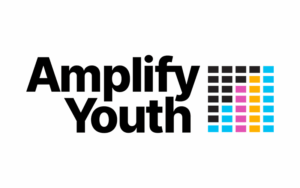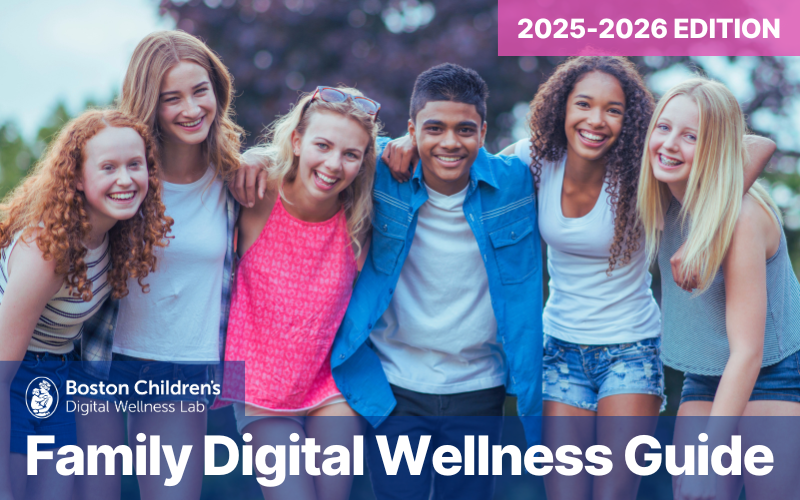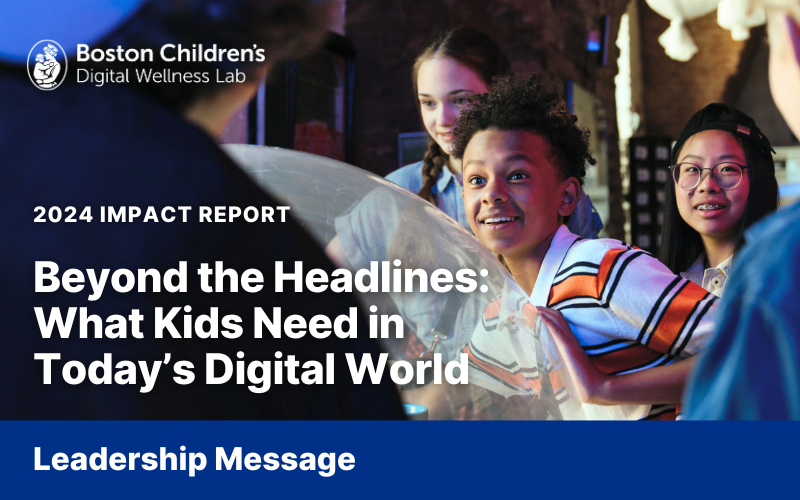A message from our Founder & Director, Michael Rich and our Executive Director, Cori Stott
From our 2024 Impact Report
Dear Friend of the Lab,
As 2024 came to a close, the world witnessed a wave of new technology policies and regulations aimed at improving youth wellbeing and safety. Parents faced a flood of reports linking technology use to youth mental health challenges—often lacking the support of rigorous academic research. Schools across the United States banned cell phones, and entire nations passed social media restrictions. These measures reflect a growing belief that young people need external controls to manage their technology use. But what if we’re overlooking the most powerful way to help them thrive in an online world?
At the Digital Wellness Lab, we hear directly from young people about their interactions with technology. Their message is clear: they don’t want to be controlled; they want to be empowered. They’re asking for reasonable boundaries, honest conversations, and media literacy education from the trusted adults in their lives. And they’re not just advocating for themselves—they recognize that creating a healthier, safer digital environment is a shared responsibility among youth, parents, educators, policymakers, and tech companies.
The reality is that no law, rule, or algorithm can replace the importance of fostering healthy relationships with technology, starting with media literacy education and self-awareness. Young people understand this—they know social media platforms are designed to keep them engaged. What they want is guidance on navigating this reality, setting boundaries aligned with their values, and using technology as a tool rather than letting it control them.
In 2024, our research found that teens whose parents establish reasonable, openly discussed, and modeled tech and media guidelines are far less likely to develop problematic media habits. When teens are taught critical thinking skills through digital media literacy, they’re better equipped to manage their online lives with intention. They don’t want to be passive consumers; they want to be informed users and creators, making deliberate choices about how they spend their time and attention.
It’s easy to feel overwhelmed by the challenges today’s youth face. Reports of rising mental health concerns among young people, including persistent sadness and hopelessness,* paint a sobering picture. But there is hope. Young people are remarkably resilient and optimistic. They want to be agents of change—not just in their own lives but in their communities. Our role is to empower them by providing knowledge, tools, and environments that enable them to thrive.
While it is critical that tech companies and regulators do their part to ensure safe and healthy digital spaces, relying solely on them is not the answer. This approach risks leaving an entire generation of children without the support and education they need now. The digital ecosystem is, and will remain, a mix of essential tools, entertainment, information, and individuals with both good and bad intentions. That’s why the best path forward is to take action ourselves, guided by science and grounded in young people’s voices and experiences. Together, we can create a culture where both youth and adults approach technology with intention, understanding, and balance.
Thank you for being part of this journey. With your support, we will continue to empower young people and their families to take charge of their digital lives and shape a future where technology enhances, rather than undermines, wellbeing.
Be well,
Michael Rich, MD, MPH
Founder & Director, Pediatrician
Cori Stott, MBA, EdM
Executive Director
* This links to the Youth Risk Behavior Surveillance System (YRBSS,) a resource on the CDC website. Please be aware that this content may be disrupted by current or future executive actions. (Feb. 2025)








